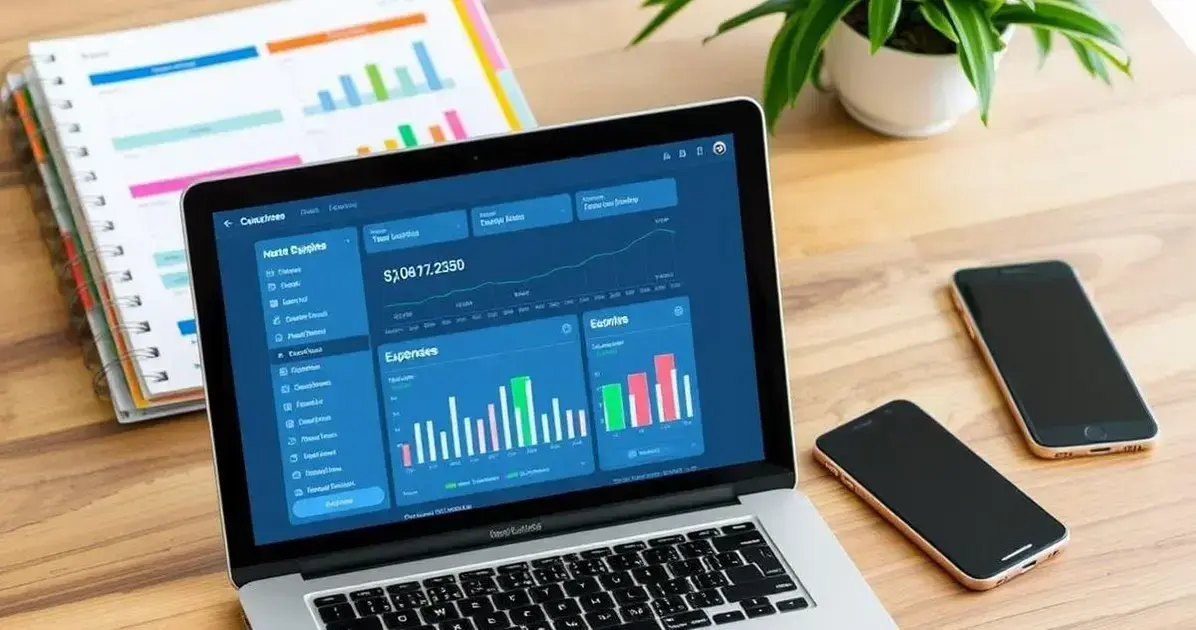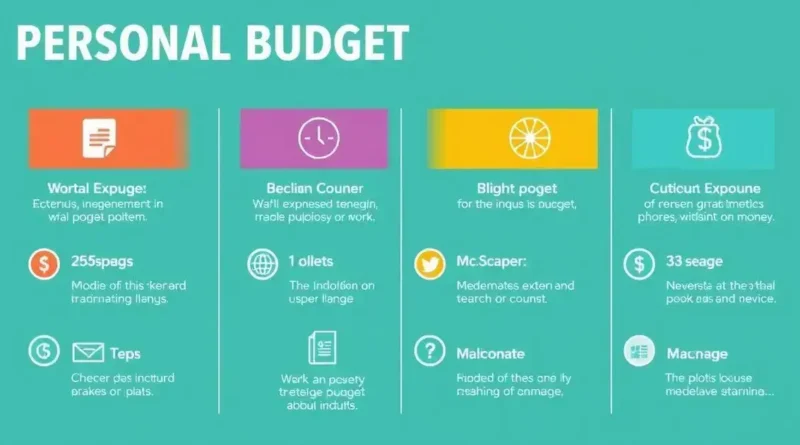Expense Categories for Personal Budget: A Complete Guide to Saving More
Expense Categories for Personal Budget are essential for managing your finances. By organizing your spending, you can easily track where your money is going each month and make smarter decisions.
Breaking expenses into categories like housing, groceries, and entertainment helps you prioritize and identify areas for savings.
Ready to get your budget under control? Let’s dive into how you can adjust and stay on track with your financial goals!
Understanding Expense Categories
Expense Categories for Personal Budget are crucial for managing your finances effectively. By categorizing your spending, you can easily see where your money is going each month, making it easier to make smarter financial choices.
Common expense categories include housing, transportation, groceries, and entertainment. Each category represents a different part of your life. By tracking these expenses, you can identify areas where you might be overspending and can cut back.
As you understand these categories better, you can adjust your budget to fit your needs. This means setting limits for each category, which allows you to prioritize important expenses while saving for future goals. A well-organized budget keeps you on track and helps you save more!
Essential Expense Categories for Personal Budget
When creating a personal budget, it’s important to include essential categories that cover all your spending needs. The first category is fixed expenses, which are costs that stay the same each month. This includes rent or mortgage payments, car payments, and insurance. Knowing these amounts helps you plan your budget accurately.
Next, consider variable expenses, which can change month to month. These include groceries, dining out, and entertainment expenses. By tracking these Expense Categories for Personal Budget, you can identify spending patterns and find ways to save money.
Finally, don’t forget about savings and debt repayment. Allocating funds for savings ensures you have a safety net for emergencies. Paying down debt should also be a top priority, helping you reduce interest costs and improve your financial health. Together, these categories make up a well-rounded personal budget.
Creating a Personal Budget Plan
Creating a personal budget plan is a great way to control your finances. First, start by writing down all your income. This includes your salary, any side jobs, and other sources. It’s important to know exactly how much money you have coming in each month. Once you have this number, you can begin to allocate funds to different Expense Categories for Personal Budget.
Next, list out all your necessary expenses such as rent, utilities, and groceries. Make sure to include both fixed and variable expenses. This step helps you see where your money goes. After listing your expenses, compare it to your total income. If your expenses are higher, consider where you can cut back.
Finally, set aside a portion of your income for savings and debt repayment. Decide how much you want to save each month and include it in your plan. A good personal budget plan helps you live within your means, pay off debts faster, and build a financial cushion for emergencies.
Tracking Your Expenses Effectively
![]()
Tracking your expenses effectively is crucial for sticking to your personal budget. Start by recording each purchase you make, no matter how small. You can use a notebook, an app, or a spreadsheet. This habit helps you see where your money goes and makes it easier to identify spending habits.
Once you have your transactions recorded, categorize them according to your budget plan. This means placing expenses into groups like food, transportation, and entertainment. By organizing your spending, you can quickly see which Expense Categories for Personal Budget are taking up most of your income and where you might need to cut back.
Review your tracked expenses regularly. A weekly or monthly check-in helps you stay accountable and adjust your budget as needed. If you notice you are consistently over budget in certain categories, it’s time to rethink your spending. Tracking your expenses helps you take control of your finances and save more.
Adjusting Budget Categories as Needed
Adjusting budget categories as needed is an essential part of managing your personal finances. Life changes, and so do your financial needs. If you find you are spending more on groceries or medical expenses, it may be time to shift funds from another category. This flexibility helps you stay on track with your overall budget while addressing your current situation.
Regularly reviewing your budget will give you a clearer picture of your spending habits. Look at the last few months and notice if any Expense Categories for Personal Budget consistently go over or under budget. If you frequently see that you spend less on entertainment but more on transportation, it makes sense to adjust those categories to better reflect your actual needs.
Remember, your budget is a living document. It should evolve with you. If you get a new job or have major life changes, such as moving or having a baby, it’s important to revisit your budget categories. Making adjustments as needed ensures that your budget remains relevant and helps you achieve your financial goals.
Tips for Sticking to Your Budget
Sticking to your budget can be challenging, but simple strategies can make it easier. One tip is to set realistic goals for each category in your budget. Make sure your spending limits are achievable. If your goals are too strict, you might feel tempted to overspend. Balance is key, so allow yourself some fun money while sticking to essential expenses.
Another helpful tip is to review your budget regularly. Take a look at your spending every week or month to see how you’re doing. If you notice you are running low in one Expense Categories for Personal Budget, adjust your spending in others. Regular check-ins keep you aware of your financial habits, allowing you to make smart choices to stay on track.
Finally, consider using tools or apps that help manage your budget. Many apps can track your expenses automatically and send alerts when you’re close to overspending. By using these tools, you can make budgeting less of a chore and more of a fun challenge. Staying engaged with your budget will make it easier to stick to your financial goals!
Common Mistakes in Budgeting
One common mistake in budgeting is not tracking small expenses. People often think that little purchases, like coffee or snacks, don’t add up. However, these small costs can quickly accumulate and throw your budget off balance.
By ignoring them, you may not have enough money left for more important expenses. Tracking every purchase, no matter how minor, is key to maintaining your Expense Categories for Personal Budget.
Another mistake is setting unrealistic goals. It’s easy to get excited and create a budget that cuts out too many expenses. If your plan is too strict, you may find it hard to stick with it. Instead, create a budget that allows for some fun and flexibility. This approach helps prevent frustration and makes it easier to stay on track.
Finally, many people forget to adjust their budgets over time. Life changes, and so do expenses. Failing to update your budget with new information can lead to overspending. Make sure to review and adjust your budget regularly as your financial situation changes, whether you get a new job or face unexpected costs. Keeping your budget current ensures you always meet your goals.
Tools for Managing Your Budget

To effectively manage your budget, using the right tools can make a big difference. Many people find budgeting apps helpful because they can track expenses on the go. These apps often let you link your bank accounts and automatically categorize your spending. This makes it easier to see where your money is going and ensures you stay within your limits.
Another useful tool is a simple spreadsheet. Programs like Excel or Google Sheets allow you to create a personalized budget plan tailored to your needs. You can design it using different categories and formulas to calculate totals. The hands-on approach gives you complete control over your budget, making it easy to update or adjust as necessary.
Finally, a physical planner or budgeting journal can also help. Some people prefer writing things down rather than using digital tools. A planner allows you to manually track spending and reflect on your financial goals. Whether you choose a digital or physical tool, the important thing is to find what works best for you and helps you stay organized.
Reviewing and Refining Your Budget
Reviewing and refining your budget is an important step to ensure you stay on track with your financial goals. Ideally, you should check your budget monthly. During this review, look at how your actual spending compares to your planned budgets for each category. This way, you can see what areas you excel in and where you might need to make adjustments.
If you find that certain categories are consistently over or under budget, it’s time to refine them. For instance, if you always overspend on entertainment, consider reducing that budget or finding ways to cut back on expenses. On the other hand, if you have leftover funds in others, think about shifting those amounts to savings or debts.
Remember, a budget is not a set-it-and-forget-it tool. As your life changes, your budget should change too. This could mean adjusting for a new job, changes in expenses, or different savings goals. Regularly refining your budget helps keep it relevant and effective in guiding your financial decisions.
Creating an effective personal budget doesn’t only involve tracking expenses; it also means understanding your income. Begin by listing all sources of income, including your salary, freelance work, or any side gigs. This way, you can have a clear picture of the total money you can allocate towards your expenses and savings each month.
Next, it’s crucial to categorize your expenses accurately. Break your spending into fixed and variable categories. Fixed expenses include rent or mortgage and monthly bills, while variable expenses can vary monthly, such as groceries and entertainment. This clear division helps you know where you can cut back if needed.
Lastly, don’t forget to set financial goals. Your budget should reflect your short-term and long-term goals, such as savings for a vacation or paying off debt. Having specific goals helps you stay motivated and makes tracking your progress easier. When you see the money going toward your goals, it will encourage you to stick to your budget.
